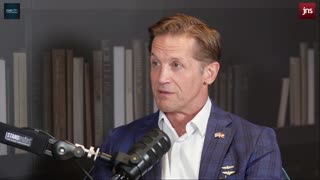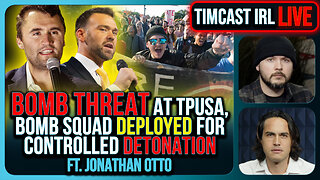Premium Only Content

Episode 3098: False Unity by Pope Leo 14th
I read an article on “Tradition in Action” titled
“On the path to establishing full communion..”
Very good article and so this episode examines the theological and historical implications of his statements on interreligious dialogue, synodality, and ecumenism, in the light of Sacred Tradition and the Magisterium prior to Vatican II.
“False Unity and True Communion: A Traditional Catholic Response to Pope Leo XIV’s Interreligious Address”
Let us begin with prayer.
O Lord Jesus Christ,
You are the Way, the Truth, and the Life.
Grant that we may not be deceived by the spirit of the age, but instead cling to You, the only Savior of mankind.
Strengthen us in fidelity to Your Holy Church and grant us the grace to discern truth from error, unity from compromise, and love from mere human sentiment.
Through Our Lady, destroy heresy and restore all things in Thee. Amen.
Our Lady of Good Success, pray for us.
St. Pius X, pray for us.
St. Athanasius, pray for us.
INTRODUCTION
Folks let me first give you the hard and fast and build from there. The Pope is vicar of Christ which means he above all must always defend the church doctrine and magisterial teaching of the church without departure. In short, he can never get it wrong. NEVER! If he gets it wrong so goes the church and the faithful.
This episode addresses a deeply troubling development at the Vatican. On May 19th, 2025, newly elected Pope Leo XIV met with 161 representatives of various false religions in what appears to be the largest inte’rreligious gathering ever hosted in the Vatican. During this unprecedented event, the Pope gave an address emphasizing ecumenism, synodality, and what he called “the will of love and life” shared by all religious traditions.
As Traditional Catholics, we must assess this moment not through sentimentality or novelty, but in the light of the perennial Magisterium of the Church, Sacred Scripture, and the writings of the saints and Fathers of the Church.
“A Radical Continuation of Vatican II”
Let us be clear from the start. Pope Leo XIV's address was not an aberration it is the logical continuation of the ecumenical and synodal vision set forth at the Second Vatican Council and promoted especially by John Paul II, Benedict XVI, and Pope Francis.
In Leo XIV’s own words, he seeks to build upon “Pope Francis’ commitment to promoting the synodal character of the Church” and seeks “visible communion among all those who profess the same faith in God the Father, and the Son, and the Holy Spirit.”
But here lies the first error: communion is not simply a matter of shared language or sentiment it must be grounded in truth. As St. Paul wrote: “What concord hath Christ with Belial? Or what part hath the faithful with the unbeliever?” (2 Corinthians 6:15).
True unity cannot exist outside of the one, holy, Catholic, and apostolic Church. It cannot be fabricated through horizontal dialogue but must be received as a supernatural gift rooted in doctrinal fidelity and sacramental grace.
“Synodality & Ecumenism: A New Ecclesiology”
Pope Leo XIV states that “synodality and ecumenism are closely linked”. This is a striking claim. Synodality, as used today, represents a shift from the hierarchical, apostolic structure of the Church to a more democratic, listening Church. This departs from the model instituted by Christ Himself.
St. Robert Bellarmine warned of such false visions of unity when he wrote:
“The Church is a perfect society, not a club of theologians or a society of negotiators. She is ruled by Christ through His Vicar.”
Modern ecumenism, beginning with the documents like Unitatis Redintegratio, (reh-deen-teh-GRAH-tsee-oh ) seeks unity through the lowest common denominator, abandoning conversion in favor of coexistence. But true charity wills the good of the other and the greatest good is salvation in the one true Church.
As Pope Pius XI taught in Mortalium Animos (1928):
“It is absurd and ridiculous to say that the Mystical Body can be formed of members disunited and separated from one another in faith.”
“Dialogue with False Religions: A Grave Confusion”
Leo XIV’s address goes even further by affirming dialogue with Jews, Muslims, and pagans, claiming we all “share the search for God and His will, which is always and only the will of love and life.”
This language blurs the essential distinction between truth and error, grace and nature, Christ and Antichrist.
Let’s be clear: Judaism explicitly rejects the divinity of Christ. Islam denies the Trinity and the Sonship of Jesus. Paganism embraces polytheism or pantheism. These cannot be reconciled with the First Commandment: “I am the Lord thy God; thou shalt not have strange gods before Me.”
St. Francis Xavier, who baptized thousands in India, wrote:
“The greatest misfortune is when souls die outside of the Church; I cannot rest knowing so many perish for lack of knowing Christ.”
If the saints and missionaries understood that salvation is in Christ alone and conversion is necessary, how can we now applaud “fraternity” without evangelization?
“From Mission to Coexistence: A False Peace”
Leo XIV echoes Francis in claiming that “we can say ‘no’ to war and ‘yes’ to peace... if only we agree.” But peace that is not rooted in Christ is fleeting. It is not the peace that the Lord gives.
Our Lord said, “Do not think that I came to send peace upon earth: I came not to send peace, but the sword.” (Matthew 10:34). That sword is truth dividing error from doctrine.
The Church has never pursued peace through silence, compromise, or equal affirmation of false religions. Rather, peace was the fruit of conversion, catechesis, and baptism.
The path from Assisi 1986 to Abu Dhabi 2019 to Rome 2025 has not led to conversion, but to confusion. And now, under Leo XIV, we see the next stage institutionalizing this confusion in the name of unity.
The Role of the Pope as the Vicar of Christ
In the traditional Catholic understanding, the Pope is the Vicar of Christ on earth. This title means that the Pope is Christ's representative, not merely a religious figure or administrative leader. His role is not to originate doctrine, but to guard, preserve, and transmit the deposit of faith handed down from Christ to the Apostles and through Sacred Tradition and Sacred Scripture.
1. The Pope Cannot Teach Heresy in the Exercise of the Magisterium
According to traditional Catholic teaching, particularly as defined at the First Vatican Council (1869–1870), the Pope enjoys the charism of infallibility when he:
• Teaches ex cathedra (from the Chair of Peter),
• Intends to bind the whole Church,
• On a matter of faith or morals.
Pastor Aeternus, the Dogmatic Constitution from Vatican I, teaches:
“The Roman Pontiff, when he speaks ex cathedra... possesses, by the divine assistance promised to him in blessed Peter, that infallibility which the divine Redeemer willed His Church to enjoy in defining doctrine concerning faith or morals.”
Therefore, when exercising the Magisterium properly especially the extraordinary Magisterium the Pope cannot err in matters of faith and morals.
But even outside infallible definitions, the Pope has the duty to uphold and faithfully transmit what has always been taught (the ordinary and universal Magisterium). He is not a theologian free to speculate publicly or promote novel teachings.
2. The Pope Must Be a Steward, Not an Innovator
As St. Paul writes:
"Let a man so account of us, as of the ministers of Christ, and the stewards of the mysteries of God." (1 Corinthians 4:1)
The Pope, therefore, must see himself as a steward, not an owner or innovator. He is entrusted with the sacred truths of the faith. He does not create new doctrine or adjust it to suit modern trends, political correctness, or human opinion.
Pope St. Pius X taught forcefully against modernism in Pascendi Dominici Gregis:
“The Church has no right to change what she has received from her divine Founder. Her duty is only to guard and expound it faithfully.”
3. The Pope Must Always Represent Christ, Not Himself or the World
The Pope’s authority comes directly from Jesus Christ, not from popular opinion, councils, theologians, or modern ideologies. If he promotes his own opinions or favors worldly ideologies over the unchanging truths of the Gospel, he ceases to act as the true Vicar of Christ in that moment, even if he retains the office.
St. Robert Bellarmine, Doctor of the Church, explains:
“The Pope is the Vicar of Christ; therefore, he must teach what Christ taught.”
And Pope Leo XIII emphasized in Satis Cognitum:
“The successor of Peter is not the inventor of doctrine, but its guardian and defender.”
4. Warnings Against Novelty
The Church Fathers and Saints often warned against novelty in doctrine and liturgy:
• St. Vincent of Lérins gave us the classical rule:
“We hold that faith which has been believed everywhere, always, by all.”
• Pope Pius XII, in Mediator Dei, warned that:
“The liturgy of the Church must never become a laboratory for experimentation.”
The traditional perspective maintains that when Popes begin to teach or promote novelties especially if they contradict prior magisterial teaching they abuse their office and scandalize the faithful.
Conclusion: A Sacred Trust, Not a Personal Platform
From a traditional Catholic view, the Pope must:
• Be utterly faithful to the Deposit of Faith.
• Guard against error and novelty.
• Act not as a political leader or a "celebrity," but as a humble servant of Christ.
• Represent the mind of Christ, not the mind of man.
If he fails in these responsibilities in his personal opinions or prudential judgments, he does not lose the office, but he ceases to act as a faithful shepherd. And if he were ever to attempt to officially impose heresy, he would ipso facto cease to be Pope (as many theologians such as St. Robert Bellarmine argue).
The Pope must always echo Christ, never himself or the world.
CONCLUSION: “Cling to the Everlasting Rock”
As Catholics faithful to Tradition, we must not despair but neither can we remain silent. Let us remember the words of Archbishop Lefebvre:
“They have uncrowned Him! But we shall proclaim Him King again with the help of Mary, Queen of Heaven.”
In a time when even the highest offices in the Church appear to praise error and honor idols, we remain firm in the Deposit of Faith.
We love the Pope when he teaches the Faith handed down from the Apostles. But when novelty undermines salvation, we resist not to rebel, but to remain faithful to Christ.
CLOSING PRAYER
O Lord Jesus Christ,
our only King and Redeemer,
grant us the courage to remain faithful when others compromise.
Enlighten Your Church, purify Her of error,
and raise up holy priests and bishops who will preach only Your Truth.
Strengthen the faithful remnant and shelter us under the mantle of the Blessed Virgin Mary.
May we live and die in the bosom of the one true Church,
outside of which there is no salvation.
Amen.
St. Francis Xavier, pray for us.
St. Robert Bellarmine, pray for us.
Our Lady of Fatima, pray for us.
Thank you for joining me today. Until next time, remember: hold fast to what was handed down, and resist the errors of our age not with hate, but with love for Christ and His Church. God bless you all.
-
 LIVE
LIVE
StevieTLIVE
41 minutes agoWarzone Wins ALL Night w/ GloryJean
58 watching -
 LIVE
LIVE
Laura Loomer
4 hours agoEP146: Loomer EXPOSES Big Tech's Complicity With Anti-ICE Violence
806 watching -
 31:39
31:39
Standpoint with Gabe Groisman
1 day ago“Most People Have NO IDEA What Isolationism could do to America” Rep Rich McCormick Joins Standpoint
168 -
 LIVE
LIVE
MissesMaam
3 hours ago75% DONE WITH PERFECTION!!! | Stardew Co-Op 💚✨
88 watching -
 LIVE
LIVE
Clenzd Gaming
1 hour agoThe Return
45 watching -
 LIVE
LIVE
DeafWarriorLegendary
25 minutes ago🔥Deaf Streamer🔥
138 watching -
 2:04:52
2:04:52
TimcastIRL
3 hours agoBomb Threat At TPUSA, Bomb Squad Deployed For Controlled Detonation | Timcast IRL
156K154 -
 LIVE
LIVE
Barry Cunningham
3 hours agoBREAKING NEWS: DEMOCRATS SHUT DOWN THE GOVERNMENT! THEY HAVE UNLEASHED PRESIDENT TRUMP
1,363 watching -
 3:59:47
3:59:47
Nikko Ortiz
5 hours agoPTSD Is Fun Sometimes | Rumble LIVE
51.9K2 -
 23:02
23:02
Jasmin Laine
7 hours ago"Carney BROKE Ethics Laws!"—Liberal SPEECHLESS After Being Cornered On CTV
9.22K15